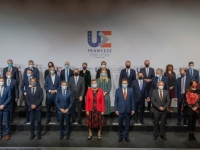Politics
France proposes three advances in security and immigration
For the European Union
USPA NEWS -
Three significant advances in the area of security and immigration under the French Presidency. After the agreement reached with the European Parliament on the Europol reform on 1 February, the EU ministers responsible for home affairs, who met in Tourcoing and Lille on 2 and 3 February, showed broad support for the French Presidency’s proposals for the governance of the Schengen Area and the immigration and asylum reform.
Speaking to the ministers in Tourcoing, on the sidelines of their informal meeting, the President of the French Republic stated that, “a sovereign Europe is one that has complete control over its borders.” The context in which the Schengen area was created almost 40 years ago has undergone profound transformation. Over time, this area has expanded and has been enriched with rules and instruments to protect one of the main accomplishments of the European Union: freedom of movement. In the face of the crises confronting Europe, be they related to migration, security or health, they should nonetheless take a further step to strengthen their capacity to anticipate them and provide an immediate collective response. "This requires increased policy guidance and modernising of the instruments allowing us to act together."
The ministers therefore agreed to create a “Schengen Council”, whose first meeting will take place on 3 March, in Brussels. On this occasion, they will establish a set of indicators allowing for real time evaluation of the situation at our borders, and, with an aim to be able to respond to any difficulty, will continue their discussions on implementing new tools for solidarity at the external borders. A coordination platform should enable more effective steering of the efforts of Member States and EU agencies, especially Frontex, whose role should be further bolstered. At the same time, the ministers will work to see through the legislative reforms under way on the Schengen Borders Code and on the Schengen evaluation and monitoring mechanism without undue delay, which will contribute to enhanced governance of our shared area.
The ministers also discussed the issues of asylum and immigration. They expressed their support for the phased approach, step by step, put forward by the French Presidency to make headway on these complex negotiations. On this basis, the Council will work over the coming weeks to define a first step of the reform of the European immigration and asylum system, which will fully respect the balance between the requirements of responsibility and solidarity.
The ministers also addressed several priority security issues, to which the European Union should provide a common response. During a working lunch, they notably covered the issue of radicalisation. Launched with a presentation by professor Gilles Kepel, this discussion demonstrated the shared concern regarding entities that encourage, from inside the EU, the spread of ideologies and ways of life that are contrary to our European values. The issue of how these entities are funded was addressed, with a particular focus on the public funding that they sometimes manage to obtain.
The future of civil security in Europe was also discussed. At a time when the concrete consequences of climate change are becoming more and more visible – sometimes dramatically – both in the European Union and in its neighbourhood, the ministers agreed on the need to reinforce their capacity to anticipate them and respond jointly. The necessary European tools have been broadly strengthened over the last few years, with the creation of a reserve of common resources and the expansion of the EU civil protection mechanism. This effort must be continued, they said. The solution to the shifting threats confronting the civil security forces furthermore requires broad mobilisation. In this respect, the role of civil society and the importance of citizen engagement, a proven model in a number of Member States, "must be notably be upheld."
Lastly, the ministers were able to observe the significant challenge posed by the growth of cybercrime, through a simulation held the previous day, with the contribution of the International Cybersecurity Forum (FIC). The participants discussed how to respond to this challenge, including the contribution of Europol, the importance of training internal security forces and the issue of creating a balanced regulation for encryption, data retention and access to electronic evidence.
Liability for this article lies with the author, who also holds the copyright. Editorial content from USPA may be quoted on other websites as long as the quote comprises no more than 5% of the entire text, is marked as such and the source is named (via hyperlink).






